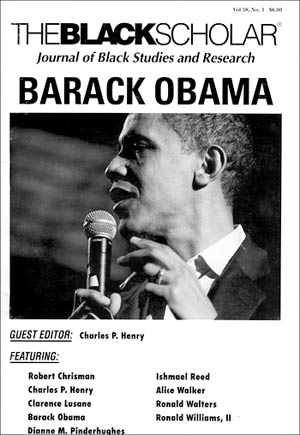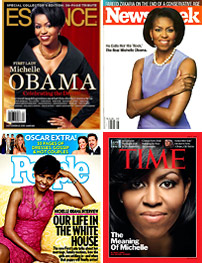Leading while black: Scholars assess the 'de-racialized' Obama White House, and Michelle's makeover as 'Mommy in Chief'
| 23 November 2009
 The
fall 2008 edition of The Black Scholar, guest edited by Black
Studies chair Charles Henry. Adjunct Professor Robert Allen
is the longtime senior editor of the journal, founded in 1969.
The
fall 2008 edition of The Black Scholar, guest edited by Black
Studies chair Charles Henry. Adjunct Professor Robert Allen
is the longtime senior editor of the journal, founded in 1969.BERKELEY — During the lead-up to the 2008 presidential election, editors of a leading black-studies publication, The Black Scholar, wrote that the national campaign, with all its "divisionary mischief and malice ... like an MRI revealed the major pathologies of the American body politic." On Thursday, progressive African American scholar-activists, celebrating that journal's 40th anniversary, conducted a follow-up evaluation of the nation's current "weird, surreal" condition, as journalist Brenda Payton put it — "led by a black president who we aren't supposed to think of as black."
In Payton's view, former President Jimmy Carter expressed what many people of color were "muttering" when he said this fall that racism was fueling inflammatory rhetoric against the president. Yet President Obama, the target of that malice, felt compelled to downplay the racial element. "Part of Obama's acumen and intelligence" is that he doesn't want to go around attributing his political troubles to race, lest he alienate white supporters, Payton told those gathered in the Barrow Hall Lipman Room.
The de-racializing of the Obama campaign and presidency was a common theme, as panelists addressed the political and cultural significance of Obama's election; historical parallels between Obama and the nation's first non-Anglo Saxon Protestant president, John F. Kennedy; and the packaging of Michelle Obama.
Common threads: John F. Kennedy and Barack ObamaPolitical scientist Robert Smith, a professor at San Francisco State and a Berkeley alum, said that Obama drew lessons from Jesse Jackson's two bids for the Democratic presidential nomination, in 1984 and 1988 — just as Kennedy learned from the 1928 presidential election, in which Republican Herbert Hoover defeated an Irish Catholic, Al Smith. On the campaign trail the latter, New York's governor, embraced his Irish Catholic heritage against the counsel of his advisers. He lost the election — "but brought into the Democratic Party huge numbers of new voters, inspired by his ethnic campaign," said Smith.
Three decades later, Joseph Kennedy Sr. advised his children that embracing their Irish Catholic identity was "no way to get ahead in America." His eldest son, John, took that advice to heart during the 1960 presidential campaign. Where candidate Al Smith had "made the mistake of kissing a cardinal's ring," JFK, facing organized opposition from Protestant churches, studiously avoided being photographed with Catholic clergy, and eschewed any association with Catholic issues (he opposed federal aid to Catholic schools, for instance).
Similarly, Obama — "charismatic, intelligent, cool, crisp, and handsome" like his Irish Catholic predecessor — downplayed race in his 2008 campaign, and continues to do so as president, Smith said. JFK appointed few Irish Americans to his Cabinet, and named Republicans to head his Treasury and Defense departments. Obama has pursued a similar strategy, Smith said.
What of the political challenges for the two "Camelot" administrations? Smith noted that the same week that JFK was murdered, Newsweek carried a story about his programs being gridlocked in Congress. "My sense is that that parallel may also carry over for Barack Obama," he said. "If he gets a healthcare bill through, it's not going to be a coherent, comprehensive piece of legislation." The other major issues on Obama's domestic agenda — financial regulation, climate change, and immigration reform — may also face gridlock on the Hill.
And that's with "the best Congress he's going to have," Smith said. Obama's domestic presidency, he believes, will end with the 2010 mid-term elections, when Republicans undoubtedly will pick up seats. The president then will focus primarily on foreign-policy issues like Afghanistan, just as Kennedy grappled with whether to escalate the war in Vietnam.
"It would take an extraordinary act of courage for President Obama to come before us and tell us this war is not worth the effort. I don't think he's going to do that," Smith predicted. "I think he's going to split the difference…. My fear is that he's going to escalate the war."
Asked later about JFK's assassination and threats against Obama, Smith said that "all of us are concerned about his security. "I don't think of Obama as a black leader," he said, but most African Americans do. If anything happened to Obama, "it would be a deep wound to black people" and "one of the worst things that has happened to the United States. It's difficult to contemplate."
Michelle's remake as 'Mommy in Chief'After Obama clinched the Democratic nomination, "Americans still worried about Michelle, because they believed she came on a little 'too strong,'" said Berkeley historian Ula Taylor. "Many questioned her fitness to serve as First Lady."
 Magazine
covers featuring First Lady Michelle Obama.
Magazine
covers featuring First Lady Michelle Obama.Perceived as a liability, Michelle "almost disappeared from the campaign" for awhile, Taylor said. "The professional attorney, gifted manager, and bright intellectual receded into the domestic sphere…. She re-emerged fully embracing the traditional roles of wife and mother, wearing an affordable dress by J. Crew" and even dancing with talk-show host Ellen DeGeneres. Americans have "become comfortable with Michelle by focusing on what she wears, where she shops, and how she mothers," said Taylor. "If she wears a sweater, it instantly sells out online."
Taylor noted that the First Lady has not actively promoted any public policies — such as measures to improve the circumstances of military families, a cause she spoke of during the campaign. "Many feminists are frustrated," Taylor said. "And while I don't agree with much of the criticism," there have been moments "when I expected more."
While the First Lady "constantly reminds journalists that she is Mommy in Chief," and the public remains fascinated with her wardrobe, Taylor gave Michelle Obama her due as a brilliant black woman keenly aware of race and class issues. Her family lineage (detailed in a New York Times article this October) leads back to slavery. Growing up, Michelle listened to the stories of her great-great-grandfather, who had been a slave on a South Carolina plantation; a great-aunt worked as a maid at Princeton while Michelle was a student there. The First Lady has spoken of the "flimsy difference between success and failure," Taylor said. "Unlike many upper-middle-class Americans, Michelle has not internalized the notion that her achievements are exclusively attributable to her own hard work and exceptional skills."
'Holding our breath'
Political scientist Charles Henry, chair of Berkeley's African American Studies department (and editor of the fall 2008 Black Scholar issue on Obama's candidacy), gave a nod to two black politicians who paved the way for Obama: Chicago Mayor Harold Washington and preacher-organizer Jesse Jackson. As minority candidates, all three needed massive voter registration of their base, strong turnout and support at the polls from those new voters, and a measure of white support. As Obama sought political office in Illinois, Henry said, it was his good fortune that Washington and Jackson before him had registered black voters and shown that a black candidate could be a serious contender for high office.
Payton, a former Oakland Tribune columnist, recalled attending the Obama inauguration with her father, one of the African American Tuskegee Airmen who flew with distinction in World War II. The image of the first black family in the White House, she said, may be "more fundamental" than anything Obama accomplishes politically as president.
Payton recalled going into a rest stop in New Mexico in recent months. Though she was the only black person on the scene, "For the first time in situation like that, I didn't try to make small talk to gauge whether they were friendly or hostile," she said. "I didn't feel I needed to…. Because the country had embraced black people in an unprecedented way, I felt a sense of belonging."
While Obama plies a cautious path through a host of political landmines, African Americans have been "very understanding of his dilemma," said Payton. "We're holding our breath. We still don't believe this."
Related coverage: "In
what ways is Obama 'different'? Charles Henry weighs in on
race, unity, and the perspicacity of Chris Rock" (Oct.
2008 Berkeleyan article)

